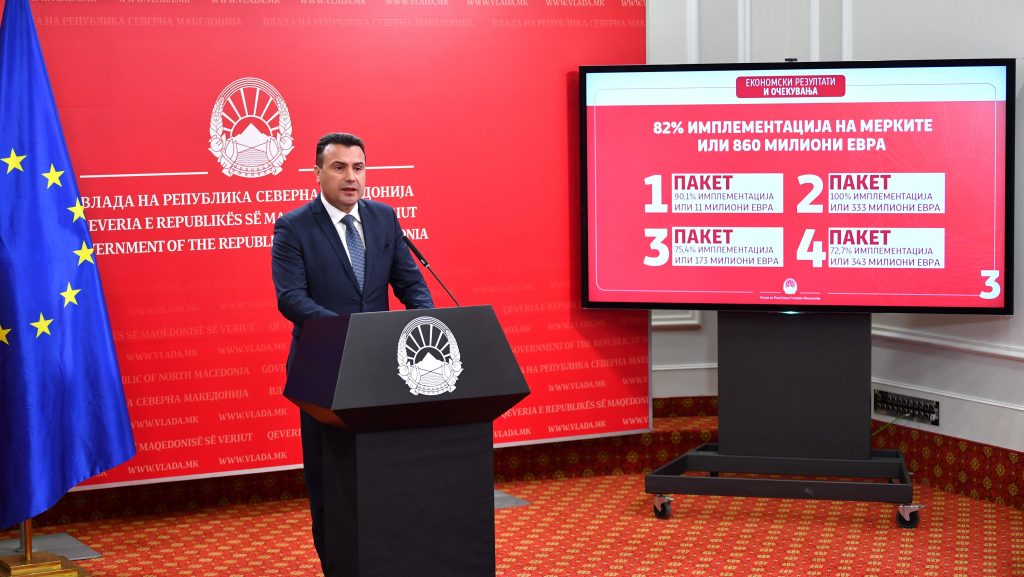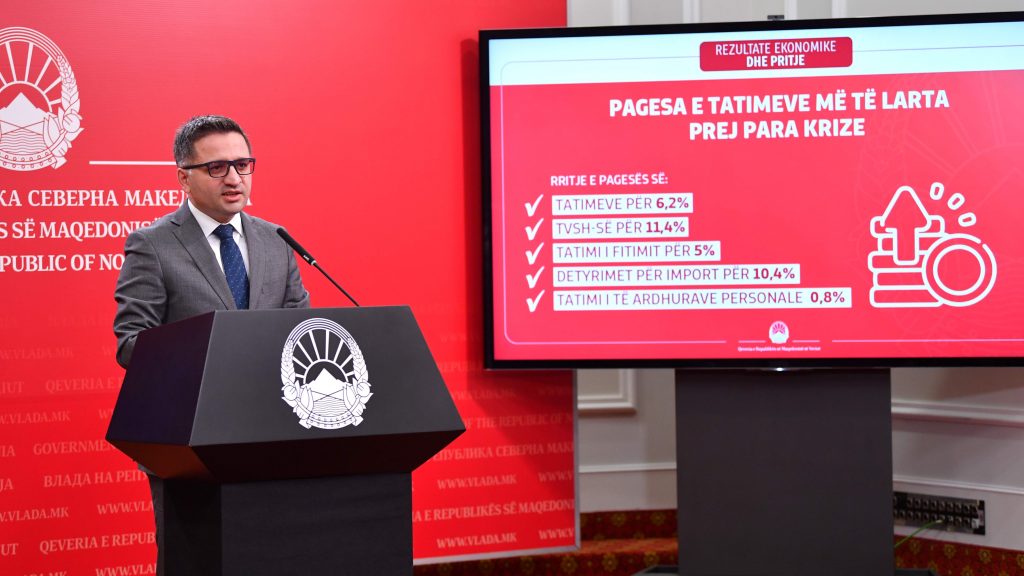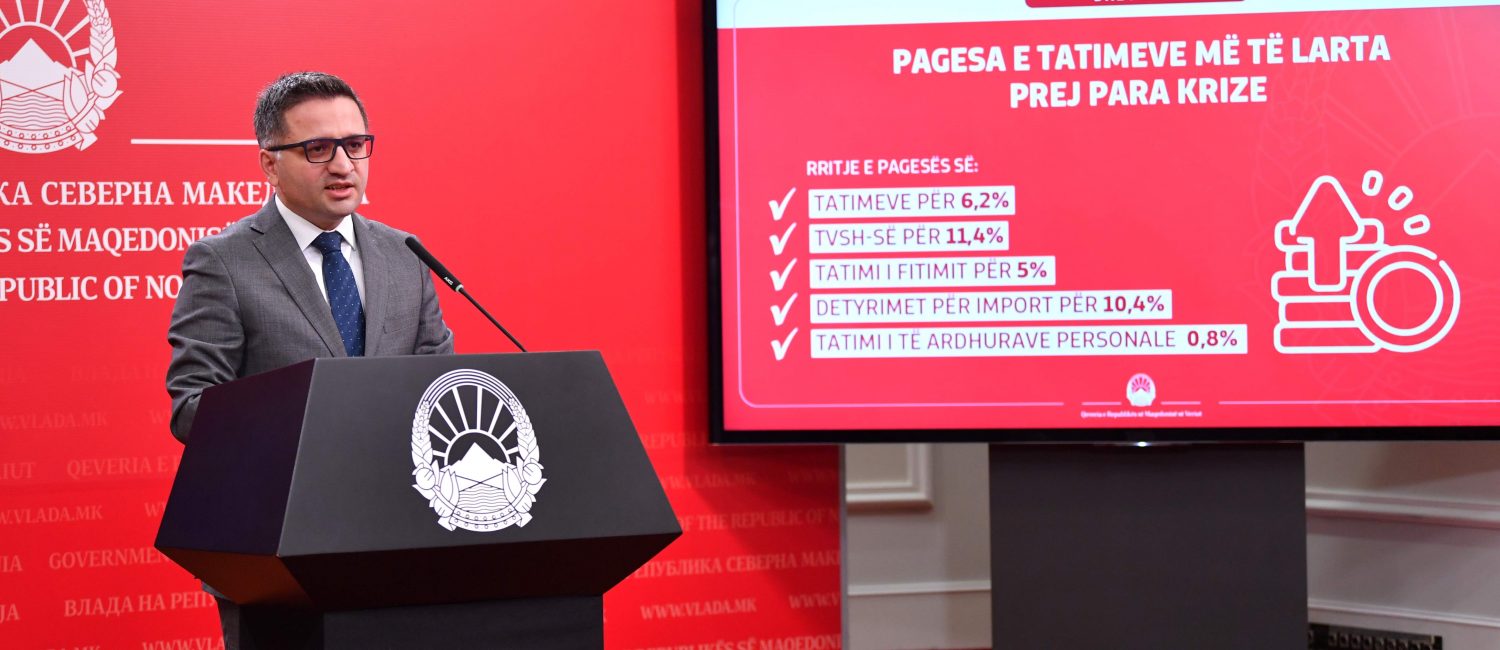8th April 2021, Skopje – Budget revenues show higher performance compared to the pre-crisis period, total revenues surged by 4.4%, with tax and contribution-related revenues increasing by 5%. Second set of economic measures is fully implemented, while overall implementation of the four sets of measures accounts for 82% or EUR 860 million. Economic measures have improved the economic result by 4.2 p.p., President of the Government of the Republic of North Macedonia, Zoran Zaev, and Minister of Finance, Fatmir Besimi, said at the press conference held on Thursday. Fatmir Bytyqi, Vice-President in charge of Economic Affairs, Coordination of Economic Sectors and Investments, Kreshnik Bekteshi, Minister of Economy, and Kire Naumov, Director of the Development Bank, also attended the press conference.

“Dynamics of implementation of the first set of anti-crisis measures accounts for 91%, with the second set of measure being fully implemented, while the implementation of the third and the fourth sets accounts for 75.4% and 72.7% respectively. It has to be emphasized that some of the measure under the third and the fourth sets are being implemented in the course of this year, hence, the overall implementation of the measures, in relation to the projections, can increase, reaching even 99%. Observed by GDP components, should no measures, such as wage subsidies, wage contribution subsidies, payment cards and all the measures we have adopted, had been undertaken, decline of private consumption would have been twice as higher, i.e. -11.8 instead of -5.6%, as it is according to the data published by the State Statistical Office. Within the four sets of measures, subject to analysis, around 70 different measures have been adopted, covering and supporting the companies and the individuals affected by the pandemic. Out of the total of 70 adopted measures within all four sets of measures, implementation of measure 21, amounting to EUR 30 million, is ongoing, while implementation of 7 measures, amounting to EUR 150 million, is pending parliamentary procedure. I hope the MPs will soon give a green light for these measures as well, Zaev said, adding that there are positive signs of economic recovery, positive recent economic developments, such as: high export growth; trade growth; increased number of crediting and increased average wage, speaking in favour therefore.
Prime Minister Zaev underlined that export experienced nominal growth of 15.4% in January on annual basis, import of goods surged by 5.3%, with the trade deficit in January dropping by 29%. In January, internal trade turnover experienced annual nominal growth of 0.8%, average wage increased by 2.7%, positive trends were observed in crediting the households and the businesses, hence total credits in February picked up by 4.4% on annual basis, unemployment rate gradually reduced, employment increased.
“According to the latest macroeconomic and fiscal trends and expectations in relation to the international economic environment, domestic economy is envisaged to get back to the economic growth trajectory in 2021, overcoming the pandemic-induced shocks. With the global economy recovering, we also expect for the external demand to recover, strongly affecting our export, as well as the domestic consumption growing, also supported by the anti-crisis economic measures, all this contributing to economic growth. We project 4.1% growth, forecasting for the export to surge by 14%, gross investments to boost by 7.7%, private consumption to pick up by 3.5 in real terms, public consumption to increase by 4.3%, while the number of employees is projected to increase by 1.9%, with the unemployment dropping respectively”, Prime Minister said.

Minister Besimi pointed out that there are positive developments in the economy registered since the beginning of the year, which can be easily detected through the revenue side of the Budget.
“Collection of tax revenues and contributions is higher by 5% compared to the same period last year – being a pre-crisis period, with no COVID-19 crisis impact, whereby taxes are collected in the amount of Denar 27,758 billion, being by 6.2% higher in relation to the same period last year. Increased performance of tax revenues is observed at almost all types of taxes: VAT collection picked up by even 11.4% compared to Q1 last year, CIT collection surged by 5%, revenues on the basis of import duties grew by 10.4%, PIT collection is almost at the same level as last year, rising by 0.8%. Revenues on the basis of contributions grew by 3.3% in relation to the same quarter last year”, Besimi pointed out.
At the World Bank/IMF Spring Meetings, taking place this week, Minister of Finance presented the Growth Acceleration Financing Plan.
“This is a new strategic document of the Government, aimed at boosting economic growth by finding new mechanisms and sources of financing, thus also having positive effects on the fiscal consolidation, i.e. narrowing the deficit and stabilizing the public debt. Growth Acceleration Financing Plan will play a crucial role for both the economy of the Republic of North Macedonia and boosting job creation, by making use of the public investments and the funds from the official creditors to mobilize the private capital. Expected results therefrom are accelerating the economic growth by twice (from 2.5% to 5% in the medium run), keeping the level of public debt and budget deficit within the Maastricht Criteria, as well as increasing the public and private investments”, Besimi said.
The essence of the Plan is to produce a multiplying effect by creating and using new mechanisms, instruments, funds and sources of funding, i.e. in addition to the planned public investments amounting to EUR 4 billion for the period 2021-2025, much more funds and investments from the private sector will be mobilized. Accordingly, total investments in the economy will experience multifold increase, thus contributing to additional acceleration of GDP growth, as well as boosted job creation.
This Plan will, in particular, underpin environmental and climate projects, innovations, as well as initiatives for a more just society.
















